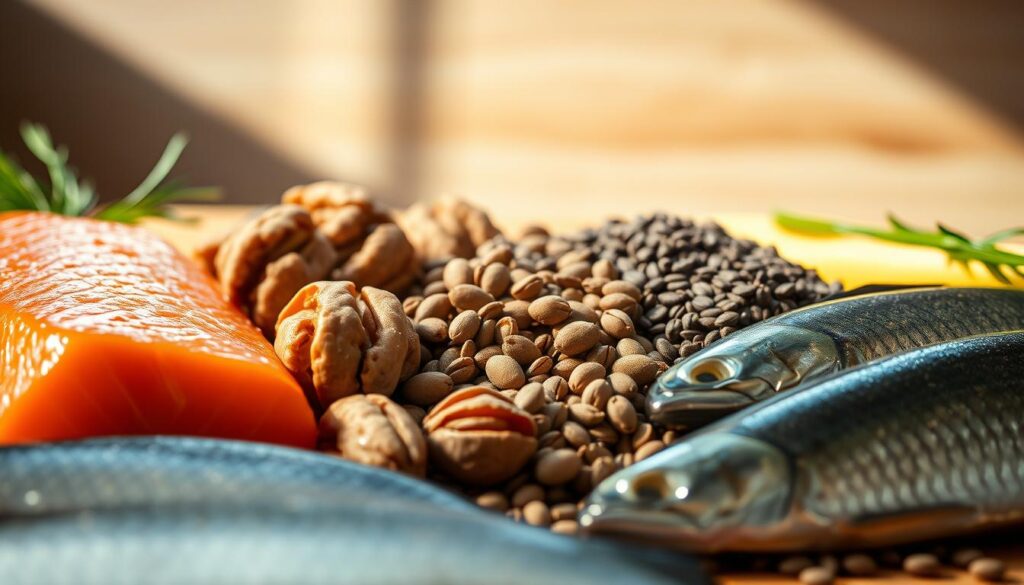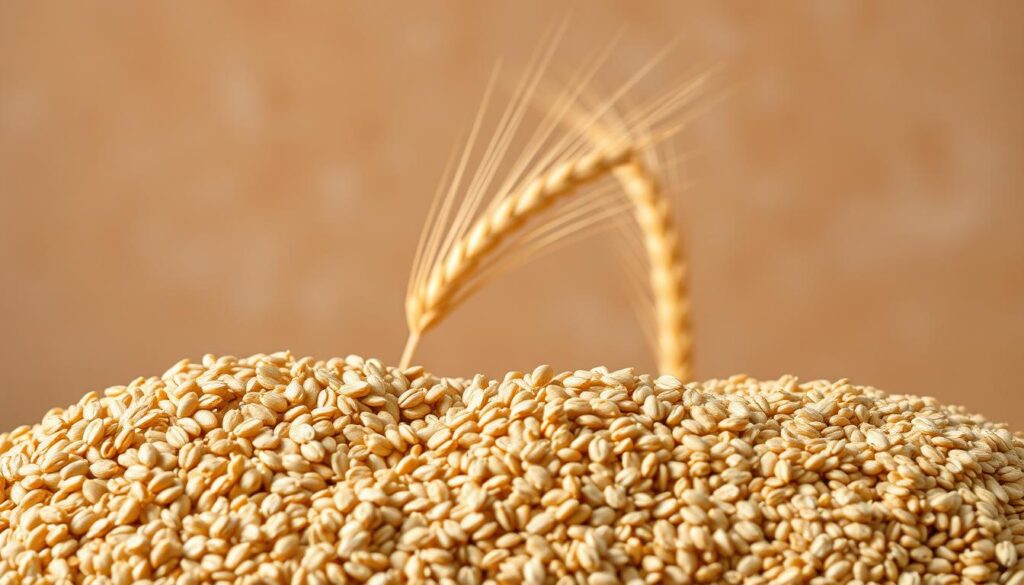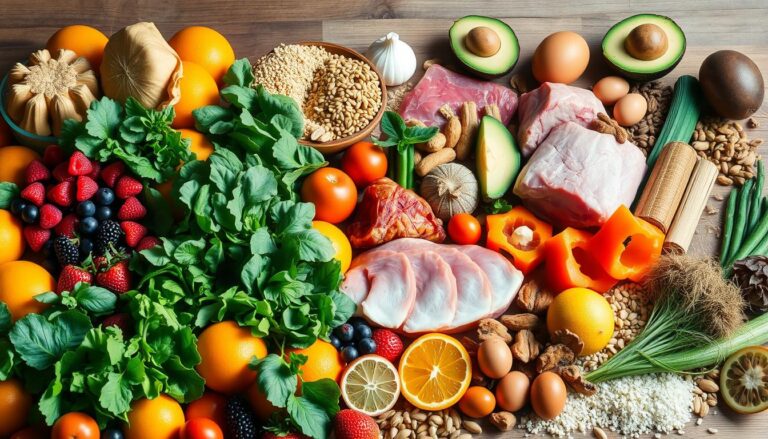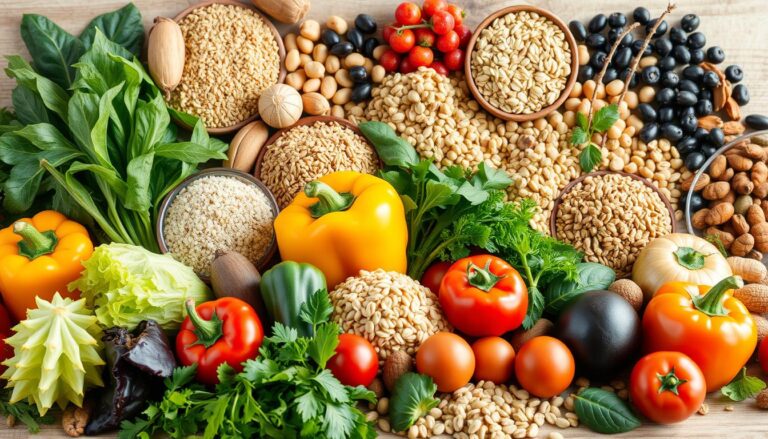How to Improve Overall Health: 5 Foods You Need Today
Table of Contents
Imagine making your health better with just a few smart food choices. Your journey to better health starts now. Nutrition is more than eating; it’s about giving your body the best foods for health.
How to Improve Overall Health : healthy eating is not just a trend; it’s a way to avoid chronic diseases. The foods you pick today can keep your heart healthy, boost your immune system, and lower your risk of serious diseases like diabetes and some cancers.
By choosing foods rich in vitamins, minerals, and fiber, you set a strong foundation for health. These choices help keep your muscles strong, bones dense, and give you energy all day.
Key Takeaways
- Nutrient-dense foods are crucial for preventing chronic diseases
- Strategic food choices can improve heart and immune system health
- Dietary improvements can reduce risks of diabetes and cancer
- Whole foods provide more nutritional benefits than processed alternatives
- Consistency in healthy eating is key to long-term wellness
Understanding Nutrient-Dense Foods for Better Health
Preventive healthcare begins with what you eat. Nutrient-dense foods are full of vitamins, minerals, and compounds that help your body work well. They give you lots of nutrition with few calories, which is key for eating healthily.
What Makes a Food Nutrient-Dense
A nutrient-dense food has lots of nutrients for its calories. It has:
- Minimal processing
- Rich in vitamins and minerals
- Low in added sugars and unhealthy fats
- High fiber content
- Natural, whole food ingredients
The Impact of Diet on Long-term Health
Your diet greatly affects your long-term health. Eating too much of ultra-processed foods can lead to serious health issues like cancer and heart disease. The Mediterranean diet, known for its nutrient-rich foods, helps lower disease risk and increase life span.
Key Nutrients for Optimal Health
To keep your body running smoothly, eat foods rich in essential nutrients:
- Proteins for muscle maintenance
- Healthy fats for brain function
- Complex carbohydrates for sustained energy
- Vitamins and minerals for cellular health
Choosing nutrient-dense foods is a smart investment in your health. It lays a solid foundation for long-term wellness.
The Power of Antioxidant-Rich Berries
Learning how to boost your health can be as tasty as munching on berries. Berries are full of nutrients that help your body stay healthy. From blueberries to strawberries, these small fruits can greatly improve your diet.
Blueberries are a nutritional superstar among berries. A single cup offers amazing health benefits:
- 84 calories
- 14% Daily Value of Vitamin C
- 24% Daily Value of Vitamin K
- 13% Daily Value of dietary fiber
These small blue fruits are more than just a snack. Recent studies show they have incredible health perks. A 2024 study found that eating blueberries daily can improve blood flow and heart health. Another 2023 study showed that blueberries might help keep the brain sharp and memory strong in older adults.
Antioxidants are your body’s defense against damage from free radicals.
When looking to improve your health, remember these berry benefits:
- Potential blood pressure regulation
- Improved insulin sensitivity
- Enhanced exercise recovery
- Support for cognitive function
| Berry Type | Key Health Benefit | Calories per 1/2 Cup |
|---|---|---|
| Blueberries | Brain Health | 40 |
| Strawberries | Heart Health | 25 |
| Blackberries | Antioxidant Protection | 31 |
To get the most health benefits, try different colorful berries in your diet. Whether they’re fresh, frozen, or in smoothies, these fruits are a fun way to support your health.
Essential Omega-3 Sources for Brain and Heart Health
Preventive healthcare starts with knowing the nutrients that keep your body running well. Omega-3 fatty acids are key players in keeping your brain and heart healthy.
To get better results, you can benefit from the benefits of this nutritional supplement

These essential fatty acids bring many health benefits. They help reduce inflammation and protect your heart. This makes them crucial for overall health.
Benefits of Fatty Fish
Fatty fish are the best source of omega-3s. Salmon, mackerel, and sardines are packed with EPA and DHA. These fish can:
- Reduce triglyceride levels
- Support heart health
- Decrease risk of mental decline
- Improve brain function
Plant-Based Omega-3 Options
If you’re vegetarian or vegan, don’t worry. There are plenty of plant-based omega-3 sources. Chia seeds, flaxseeds, and walnuts are great alternatives to fish-based omega-3s.
Daily Recommended Intake
Experts say you should get 250-500 mg of EPA and DHA daily. This is for the best health benefits. Talking to a healthcare professional can help figure out what you need.
Leafy Greens: Your Daily Dose of Vitamins

Start changing your eating habits by adding leafy greens to your diet. These greens are full of vitamins and minerals that boost your health. The USDA says veggies should be half of your plate, making greens essential.
Dark leafy greens are nutritional powerhouses. They are rich in:
- Vitamin A for eye health
- Vitamin C to boost immune function
- Vitamin K for bone strength
- Minerals like magnesium, zinc, and calcium
Spinach is a standout green. One cup of raw spinach gives you 15% of your daily folate. The carotenoids in these greens may fight off some cancers, making them key for a healthy diet.
Adding leafy greens to your meals is easy. Mix spinach into smoothies, kale into salads, or Swiss chard into stir-fries. Eating three to four servings of veggies a day is best for your health.
Your body craves the nutrition that leafy greens provide – make them a daily priority!
How to Improve Overall Health Through Whole Grains

Whole grains are packed with nutrients that boost your health. They offer more than just food – they help keep your diet balanced and healthy.
Understanding Complex Carbohydrates
Complex carbs in whole grains give you lasting energy and important nutrients. Unlike refined grains, whole grains have the bran, germ, and endosperm. This means you get the most nutritional benefits with every bite.
- Bran contains essential fiber and trace minerals
- Germ provides vitamin E and B vitamins
- Endosperm offers protein and carbohydrates
Top Whole Grain Choices
The American Heart Association suggests eating at least three servings of whole grains a day. Here are some great choices to enhance your healthy eating:
- Quinoa: Gluten-free and protein-rich
- Brown Rice: Versatile and nutrient-dense
- Oats: Quick to prepare and heart-healthy
- Bulgur: Rapid cooking time of just 15 minutes
- Whole Wheat: Packed with fiber and vitamins
Pro tip: Aim to replace at least 50% of your grain intake with whole grain alternatives to improve overall health.
Adding these whole grains to your meals makes them tasty and supports your health goals. Remember, small changes in your diet can make a big difference in your well-being.
Protein-Rich Foods for Muscle Maintenance
Keeping your muscles healthy is key to good eating habits. Protein is essential for muscle growth, repair, and body function. It helps build strong muscles, makes important enzymes, and boosts your immune system.
There are many great protein sources, both from animals and plants. Here are some top foods to help keep your muscles strong:
- Lean Meats: Chicken breast has about 35.5g of protein per serving
- Fish: Salmon has around 40.4g of protein per half filet
- Plant-Based Options:
- Tofu: 13g of protein per 100g serving
- Lentils: 17.9g of protein per cup
- Edamame: 18g of protein per cup
Experts say you should eat 0.5 to 0.8 grams of protein for every pound of body weight. Eating a variety of protein sources is important. This ensures you get all the amino acids your body needs.
Pro tip: Mix different protein sources to get more nutrients and keep your meals fun!
It’s not just about how much protein you eat, but also the quality. Choose lean proteins and eat a variety of them. This helps keep your muscles healthy.
The Role of Healthy Fats in Nutrition
Understanding healthy fats is key for good health. Not all fats are the same. Knowing which ones to eat can greatly improve your health.
Monounsaturated Fat Benefits
Monounsaturated fats are great for your health. They can lower bad cholesterol and reduce heart disease risk. Extra-virgin olive oil is a top choice for these fats.
- Supports heart health
- Helps regulate cholesterol levels
- Reduces inflammation in the body
- Promotes better insulin sensitivity
Sources of Healthy Fats
Your body needs different healthy fats to work well. Nutrition experts say to add these foods to your diet:
- Avocados: Rich in monounsaturated fats
- Nuts and seeds
- Olive oil
- Fatty fish like salmon
Choose healthier fats over bad ones. The American Heart Association says to limit saturated fats to 10% of daily calories. That’s about 10 to 15 grams a day for most adults.
Remember, fats are essential for hormone production, brain function, and nutrient absorption.
Building a Balanced Meal Plan
Improving your health starts with meal planning. Studies show that 53% of Americans plan their meals, cutting food waste by up to 33%. They also eat more fruits and veggies by 28%. Your meal plan should aim for balanced plates with various food groups and right portion sizes.
Controlling portions is key to managing calories and reaching your health goals. The U.S. dietary guidelines suggest half your plate for fruits and veggies. The rest should be protein and whole grains. A balanced breakfast could be a quarter of protein, a quarter of whole grains, and half fruits.
Exercise and stress management are also important. When planning meals, think about how foods affect your energy and health. Eating smaller, healthy meals keeps your energy up and supports your metabolism. Choose foods that help you sleep better too.
Using these meal planning tips can change how you view nutrition. Aim for consistent, healthy choices that support your health goals. Start small, be patient, and know each healthy meal brings you closer to better health.
FAQ
What are nutrient-dense foods and why are they important?
Nutrient-dense foods give you lots of vitamins, minerals, and good stuff for not many calories. They help keep you healthy, boost your immune system, and prevent diseases. Eating foods like berries, leafy greens, and whole grains helps you get the most nutrients and stay well.
How many servings of berries should I eat per week?
Experts say eat 1-2 cups of berries weekly. Blueberries are especially good because they’re full of antioxidants. These can improve memory, help your heart, and lower disease risk. You can add berries to smoothies, yogurt, or just enjoy them as a snack.
What are the best sources of omega-3 fatty acids?
The best omega-3 sources are fatty fish like salmon, mackerel, and sardines. If you don’t eat fish, try chia seeds, flaxseeds, walnuts, or algae supplements. Eating 250-500 mg of omega-3s daily is good for your brain, heart, and reduces inflammation.
Are whole grains really better than refined grains?
Yes! Whole grains have more fiber, vitamins, and minerals than refined grains. They give you lasting energy, help your digestion, and may lower disease risks. Choose whole grains like quinoa, brown rice, oats, and whole wheat.
How much protein do I need daily?
Protein needs vary by age, sex, and activity level. Adults should get 0.8 grams of protein per kilogram of body weight. For a 150-pound person, that’s about 54 grams of protein daily. You can get protein from lean meats, fish, beans, lentils, and tofu.
What are healthy fats, and how much should I consume?
Healthy fats are in foods like olive oil, avocados, nuts, and seeds. They’re good for your heart, brain, and hormones. Try to eat 20-35% of your calories from healthy fats, like olive oil, avocados, and nuts. Avoid saturated and trans fats.
How can I incorporate more leafy greens into my diet?
Add spinach to smoothies, use kale in salads, sauté Swiss chard, or blend greens into soups. Aim for 2-3 servings of leafy greens daily. They’re packed with vitamins A, C, and K, and minerals like iron and calcium.
What’s the best way to create a balanced meal plan?
Eat a variety of nutrient-dense foods, like lean proteins, whole grains, healthy fats, and fruits and veggies. Use portion control, aim for balanced meals, and plan ahead. Stay hydrated, exercise, manage stress, and get enough sleep for overall health.







